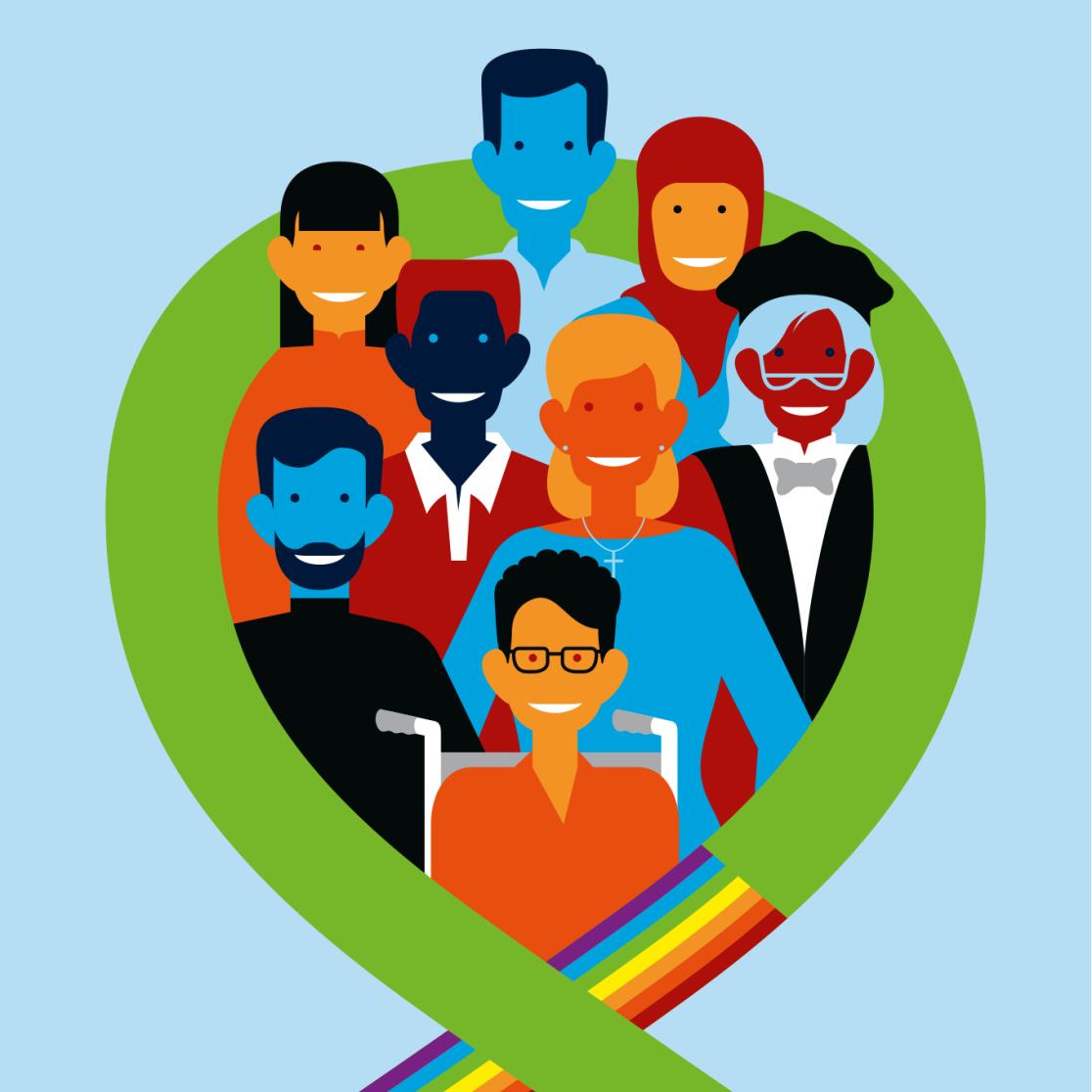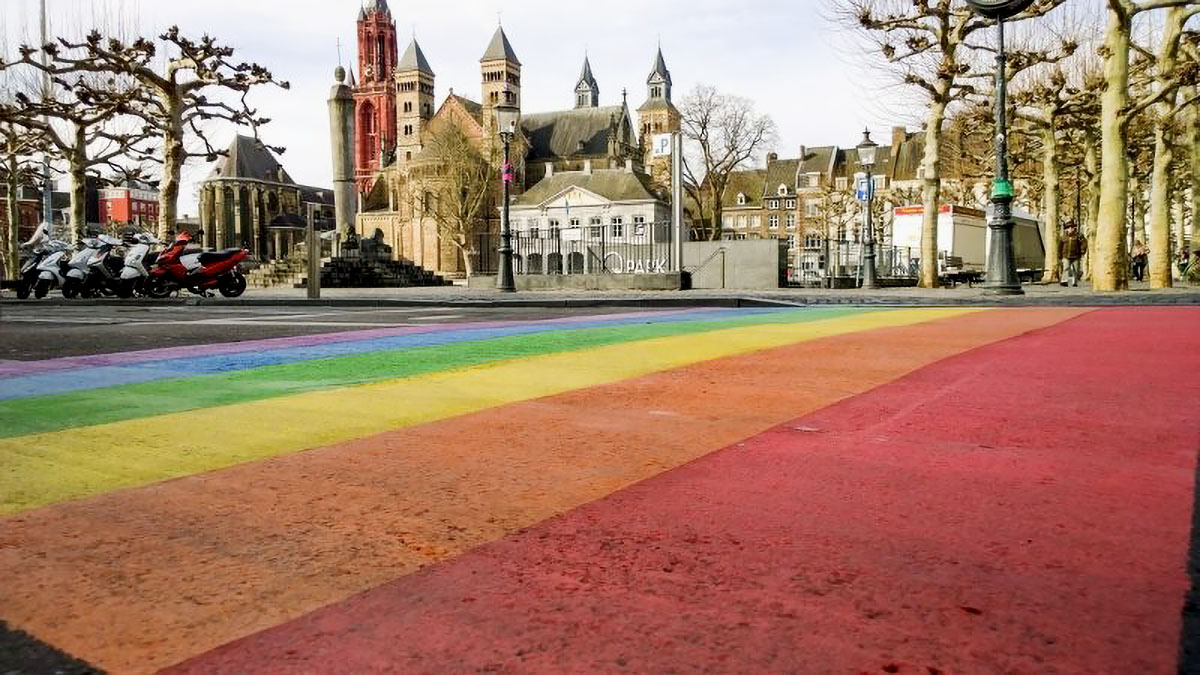Beaming with pride
UM Pride offers a safe, inclusive and supportive platform for all LGBTQ and allied students and staff members of Maastricht University. Co-founder Stephanie Blom and project leader Alexander Dieleman talk about their contribution to fostering a diverse community.
While similar initiatives exist at most universities, UM Pride is fairly unique in that it is made up of students as well as faculty. “We have a lot of international staff,” says Stephanie, “some of them are from very different cultures, and we thought it would be important to make sure they feel safe as well, so they can act as mentors or role models.”
To be as open as possible, and in recognition of how serious UM is about its diversity policy, UM Pride chose to be part of the diversity office. “Rianne Letschert and [diversity officer] Constance Sommerey were very supportive and are still attending our events,” Alexander explains, “we wanted to be fully integrated and be there for all members of the UM community.”
Land of unicorns and glitter
Initiatives along the lines of UM Pride are in a peculiar position because they happen against a backdrop of national acceptance: the Netherlands was the first country to legalise equal marriage in 2001. Once you gain the right to marry, you lose the right to complain – thus goes the sullenly homophobic corollary. But grudging forbearance is not yet inclusivity.
“In the Netherlands, we haven’t really continued the conversation about acceptance – whether it stops at tolerance or should be about active inclusion,” says Stephanie. “Lots of students from less progressive countries think this is the land of unicorns and glitter – and then they come to a small city, which might not have a very vibrant LGBTQ scene, especially if you don’t speak Dutch.”
A rainbow citadel
Being very international, UM already has in place a culture geared at making internationals feel welcome. UM Pride adds a safe space that allows LGBTQ people to safely explore who they are and to build the confidence to engage more authentically with the wider community. “We’re a group of people you can talk to, who will recognise your issues and accept you,” says Alexander.
“LGBTQ folks go through a kind of second puberty at university; maybe you only get to explore your sexual identity then,” he explains, “either because you didn’t know before or because you didn’t feel comfortable connecting with that part of you. So you have to learn to how be comfortable with yourself, how to date, how to have relationships…”
Backed by statistics, straight cis people view themselves as the default. Culture provides them with a standard script they can follow, so they never have to wrestle with those fundamental questions of identity. UM Pride is a place where the LGBTQ community can talk about such issues and make up for lost ground. But, adds Stephanie, “even if you’re just curious about LGBTQ issues, you’re always welcome!”
Out and proud down South
She herself has also felt more welcome than she had expected: “Back in Amsterdam, they warned me that I’d struggle because I’m not from Limburg and that it is a really conservative place, so being gay would be tough. But, unlike in Amsterdam, I’ve never been harassed here and people were really accepting, kind and interested – if you’re willing to engage with them.”
And because starting a conversation beats lecturing people on how intolerant you presume them to be, UM Pride has done just that – and fared well: “The problems usually arise from misunderstandings. People are really open; we didn’t come across anyone who is unwilling to listen, so long as they feel safe and respected.”

If you are a queer member of the UM community, or if you're just interested, or if you are highly suspicious of the LGBTQ community and want to make sure they’re not plotting a radically inclusive revolution, you can attend UM Pride’s monthly queer coffee hours, visit their biweekly walk-in consultation hours, or contact one of their confidential advisers.

A little welcome goes a long way
Why change things for a small minority? Then again, why not, if it makes no difference to you but means the world to someone else… “It’s the same with gender-neutral toilets. If you are transgender, you might feel unsafe in the men’s toilet or don’t want to be ‘that dude’ in the ladies’ room. It makes a huge difference for those people.”
Stephanie owns the fact that she’s on an ideological quest to make UM’s culture even more inclusive. “In my case studies as a lecturer, I always make the judges female and I often address LGBTQ issues. Small changes can snowball into something bigger.” It’s easy to see how a culture in which you barely see yourself represented would not be conducive to your flourishing.
“It’s important to focus on micro-level acceptance,” Alexander thinks. UM Pride can facilitate this progress towards normalisation within the community and on an individual level. “Once you have had the space to come to terms with and explore your queer identity, it stops being such a big issue for yourself.” While both acknowledge that patience is paramount, they say progress has been much faster than they ever dared to expect.
By: Florian Raith
LGBTQ stands for lesbian, gay, bisexual, transgender and queer. The latter can be used to describe anyone not fitting traditional gender or sexual identities – and is the inclusive dyslexic’s go-to-option.
Also read
-
Andrés Caceres Solari on No room for Human Rights in Gaza and Ukraine: How the Law Legitimizes Urban Devastation
Pick Our Brains Session with Andres Caceres Solari

-
AMIBM hosts the final Realise-Bio conference
The Aachen Maastricht Institute of Biobased Materials (AMIBM) hosted last week the third and final Realise-Bio annual conference, bringing together the Dutch and German bioeconomy ecosystems at the Brightlands Chemelot Campus.

-
Macrophages as key to treating liver fibrosis
Sabine Daemen is researching how certain macrophages can slow down fatty liver disease and fibrosis in order to develop new therapies.
